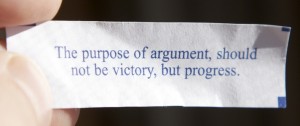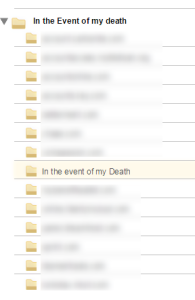When Does Saving Turn into Hoarding?
Over at Christianpf.com they had a good discussion on this topic with some good practical ideas on what to look at. I have a question as a thought experiment. Should Christians have a self imposed (I believe any sort of forced cap would be immoral) income or networth cap? I read about a church that did this for their leadership about 15 years ago. It felt like an over reaction to the prosperity “gospel” of the day and I wasn’t sure how I felt about it. But now I wonder if there is some wisdom in it.
We talk a lot here about how personal finance is personal and much of it deals with a position of the heart, but while we can talk about shades of gray eventually grey becomes black and I have been thinking a lot about where grey becomes black in the case of savings v. hoarding.
The Bible clearly states that saving is a good thing (see Proverbs 21:20) and that hoarding is not (see Luke 12:20-21). But is there a clear distinction between the two? And how can we know if we have crossed the line? There must be a line, but is it completely subjective or not? Should we think nationally where we may be in the bottom 10% or globally where if you are American you are in the top 1% no matter how poor you are?
I would love to have a constructive conversation about this because I process by talking things through. Does the Bible speak to this? I think John did in Luke 3 when he tells the people give one of their coats away if they have 2 and their neighbor has none. My family has more coats than we can fit in our closet! But so do most of our “poorer” neighbors.
So, what would this look like? I have no idea as I said it is a thought experiment and I would love to hear from anyone even if you think I am crazy. Drop a line in the comments below.
Survivor Checklist with Lastpass
 One big danger in the life of the person who takes care of the finances is death. Ok, sure we could all die, but if I died right now my wife would struggle to know how to access our insurance policies, bank accounts and other financial information. I run a lot of the day to day stuff in our home. While my wife is well informed of our current financial situation there are a lot of accounts out there. It would be a struggle for her to find them all. For years we have talked about a survivor checklist, but have never gotten around to creating a manual one, and I would never update it for each password. Then I thought about a tool I have used for years; Lastpass.
One big danger in the life of the person who takes care of the finances is death. Ok, sure we could all die, but if I died right now my wife would struggle to know how to access our insurance policies, bank accounts and other financial information. I run a lot of the day to day stuff in our home. While my wife is well informed of our current financial situation there are a lot of accounts out there. It would be a struggle for her to find them all. For years we have talked about a survivor checklist, but have never gotten around to creating a manual one, and I would never update it for each password. Then I thought about a tool I have used for years; Lastpass.
What is LastPass?
If you don’t know about Lastpass it is an amazing password management tool. It securely holds all of your internet account passwords and can autofill them for you. It also generates passwords for you, runs security scans and helps to keep your online account information safe. It can be used as a browser plugin or a phone application (premium service only) It also allows you to keep secure notes, a feature I never thought very much about until I was thinking about this survivor checklist. This is a way for me to communicate all of my passwords to my wife and help her remember all of the things that will need done. (hopefully someone else will be doing it for her).
I created a folder called “In the event of my death” with a note of the same name. It lists emails for our attorney and insurance agents so she won’t need to search. It also has a last goodbye and a few other personal items. These accounts are always up to date because they are what I use every day to access everything.
No one wants to think about death, especially their own. But, we will all die. If you are the person in your family who does most of the book keeping and money management and you don’t prepare something for your spouse to help them in the transition it will only make this time harder for them.
What to include in your Survivor Checklist
- Bank names, accounts and usernames and passwords
- Lawyer’s name and information for your will. (You do have a will, right?)
- Name and Number for Insurance agent for life insurance. (You do have insurance, right?)
- People to be notified of your passing with contact information.
- Any wishes not included in your will
- Perhaps, write your own obituary, that was really hard for us when my dad died.
- You may want to include something like this checklist from the Dennett, Craig and Pate funeral home.
- Copies of your social security, passport, birth certificate, all encrypted with Lastpass
Honestly, this is a lot of work. I would rather not do it, but I love my wife and want to make her life as easy as possible in the event of my passing. That thought helped me get through the process.
Resources:
Life hacker Master information kit.
Considering Stewardship is a site dedicated to managing your time, money, and talent in light of the Gospel.
Edited for broken link.
Giving Differently
Thought like this should make us think about how we help the poor in our context. There is evidence that giving cash directly to the poor may do more for them than expensive programs meant to do for them what we feel they can’t do for themselves. What are your thoughts?
Acts 4:32 – All things in Common
So, I haven’t been posting recently because of a few things popping up at church. I taught a class in February and then I was asked to preach. So, I decided to post my sermon. It is my first time preaching in 8-10 years so I was a little rusty but I hope it blesses you.
Podcast: Play in new window | Download
Things I learned from changing jobs
Changing Jobs
Almost a year ago I went through the process of changing jobs. In that change, I left a nationally known company where I had worked for eight years for a company I had never heard of until the recruiter called. The process I went through to decide if the new offer was better than my current job was pretty thorough. I am the kind of geek that created a spreadsheet comparing everything I could think of: salary, vacation plans, 401(k), bonus opportunities, commute times, holidays and a few other things. I tried to quantify things that were never meant to be quantified. I learned a few things about my self through that process.
I don’t trust God nearly as much as I thought I did.
 I actually ended up having two job offers on the table at the same time. (Yes, I know, it is an embarrassment of riches) But, I don’t think I prayed about my new position as much as I should have. I felt that I could quantify everything and it would basically be a mathematical decision. Of course, it doesn’t work that way. But, I am really the kind of guy that doesn’t like to pray about the simple things. “Why bother God with things I can work out out on my own?”
I actually ended up having two job offers on the table at the same time. (Yes, I know, it is an embarrassment of riches) But, I don’t think I prayed about my new position as much as I should have. I felt that I could quantify everything and it would basically be a mathematical decision. Of course, it doesn’t work that way. But, I am really the kind of guy that doesn’t like to pray about the simple things. “Why bother God with things I can work out out on my own?”
I am still lead by my wallet far more than I want to be.
The fact that I made the decision by calculating the most minute details about money says a lot about how I view money in my life. The major deciding factor on if I took a new job was the money. Granted being a good steward of my skills means I should consider how much those skills are worth and find ways to use those skills to care for my family. But I don’t feel like I should be making decisions based predominately on my wallet, however, I still find security in my bank account and a steady paycheck.
There is Grace for it all
As many mistakes as I made along the way God’s grace is more than sufficient. That is the most important lesson.
All in all I am persuaded that I made the right decision. I am more satisfied with my new job than I was at my old job and I am making more money now. (Funny though, it still doesn’t feel like enough, even though I swore it would be; Ecc 5:10)
image by jakecaptive
What do I do when I have a church money disagreement?
 Unless you are one of those dictator Pastors who always does what they want regardless of wise council or you don’t bother to pay attention, eventually you are going to disagree with something your church is doing in regards to money. Then what? Do you stew in bitterness and harbor resentment towards your leadership? Do you stop giving and hold your money ransom until you get your way? Do you attempt to talk things over with leadership in hopes that they will listen to you and change their erroneous ways?
Unless you are one of those dictator Pastors who always does what they want regardless of wise council or you don’t bother to pay attention, eventually you are going to disagree with something your church is doing in regards to money. Then what? Do you stew in bitterness and harbor resentment towards your leadership? Do you stop giving and hold your money ransom until you get your way? Do you attempt to talk things over with leadership in hopes that they will listen to you and change their erroneous ways?
Probably none of those.
Giving to your local church is not the same as doing business with a restaurant whose political policies do not line up with yours. It is fine to boycott a place because you don’t like what they do with their profits that is your right as an American. But your local church is a place that is supposed to help you grow in the Lord and the leadership of your local church, what ever form it takes, are responsible for shepherding you, and they will answer to the Lord for how they do that. We can all be very sinful in our attitudes about money so if you find yourself upset about how your church is dealing with money here are some things to consider.
It is God’s Money to begin with.
The money that God has entrusted to us belongs to him. He has entrusted us as stewards of his many gifts. If God has called you to be a part of your church then he also knows and did know how they would handle his money. That is not to say that church leaders can’t make mistakes, but as I already said they will have to answer to God for their actions as leaders of the church not you. If this disagreement is over something minute then we should consider simply letting it go with prayer for our leaders to gain wisdom or for God to help us see the wisdom in their actions.
This obviously isn’t to say you should be reckless with God’s money but remember that you are part of a larger body and occasionally that means is giving up your right to be right.
They are only human and you can talk to them.
When I did a quick survey of the best pastors I know, to a man, they all said they would want to be addressed directly. Now depending on the size of your church this may be a logistical issue, but you should still try. Those who lead a church are only human and they may very well be in error. However, you should enter the conversation humbly as well. It may be that you are wrong in this matter. If you are a member of the church they should be willing to listen to your concerns and walk you through the situation. Maybe you will help to correct them or maybe they will help correct you. You have to be prepared for both possibilities and humbly pray for God to work on both sides.
Why would you withhold money?
I believe in a free market and the right of a customer to vote with their wallet and do business elsewhere. However, this is not that situation. If you are thinking about withholding your money because of this disagreement and you have already talked with your leadership then you should ask yourself, “Why?” Are you doing this to manipulate your leadership? Are you doing it because you really believe there is a sin issue involved with what the church is doing? The former would not be acceptable while the second one may. I would still seek wise council before making any rash decisions. It isn’t easy when you have a church money disagreement, but it is a great opportunity to grow in grace.
Have you ever been in this type of situation? How did it go? Tell me below in the comments.
Image by imnotquitejack
New Year Goals
New Year Goals
First, let’s talk about why you are taking this course? Why do you want to get your finances under control and pay off debt. Having these reasons straight in your mind can help you succeed when the going gets tough.
These reasons are very important because they will need to be your motivation when things get tough. There will come a time in this journey when you are going to want to give up because things just aren’t fun and exciting anymore. Because things aren’t as easy as you thought they would be or when things aren’t moving as fast as you thought or when you hit a major setback.
 Do you want more money when you retire?
Do you want more money when you retire?
Do you want be a better steward of the gifts God has given you?
Do you want to save up for your family?
Do you want to get out from under the crushing weight of debt so you can feel some freedom?
Do you want to get your finances under control
Seek out every reason you can, intellectual, scriptural, emotional and write full sentences about why you want to take this journey. Make these personal reasons that will mean something to you as you move through the process of getting debt under control.
Take your time on this step, it would be easy to cast it aside and just jot down a few things, but the more time you spend on your foundation the better off you will be down the line. You will refer to this down the road when you need motivation.
This is the first in a series designed to help you start the New Year off right. Make sure you don’t miss out on any pieces of the series subscribe to our site by email.
Image by BK
Stewardship and the Gospel
Stewardship and the Gospel
 Writing continuously about personal finance can become boring after a while, much like stewardship itself. We experience a diminishing return of excitement after the initial eye opening experience. So, I feel like I am writing the same things over and over. Anyone who has been keeping up on their stewardship probably feels like they have been doing the same thing over and over again. There just isn’t much new and exciting.
Writing continuously about personal finance can become boring after a while, much like stewardship itself. We experience a diminishing return of excitement after the initial eye opening experience. So, I feel like I am writing the same things over and over. Anyone who has been keeping up on their stewardship probably feels like they have been doing the same thing over and over again. There just isn’t much new and exciting.
That is simply the truth of the matter. There aren’t a lot of new and sexy things in personal finance and stewardship. It is a long slow voyage with the occasional exotic port of call like “paid off credit card island” or “St. No More Student Debt” or even “God called me to give a large more bay”, but the reality is you will be doing the same thing for a long time to take care of God’s money properly.
The same could be said for the Gospel. Even though many people try to make the gospel more than it is. We need to be constantly reminded of the simple message of the Gospel. Jesus Christ died on the cross in your place for your sins. That simple message affects every areas of our lives. Our churches should be preaching this message even when it feels like we are saying the same thing over and over again. We all need to hear it.
Stewardship starts with a simple message: spend less than you make because your money is not your own, it belongs to God and he allows you steward his money and desires that you do so responsibly. There are a million ways to save money and live a more conservative lifestyle but the message is still the same. Treat your resources like they do not belong to you. Remember to make your decisions in light of that fact. Your time, your money and your talent are all God’s.
As long as people will continue to read, I will continue to write. God’s money is to be stewarded well and I will remind us all (myself included) of that.
image by wonderlane
Giving Questions
 Recently someone from our church asked me a set of giving questions to be used in a lesson series we are doing. I thought they would make a good mini post.
Recently someone from our church asked me a set of giving questions to be used in a lesson series we are doing. I thought they would make a good mini post.
“ I am afraid the only safe rule is to give more than we can spare. In other words, if our expenditure on comforts luxuries, amusements etc is up to the standard common among those with the same income as our own we are probably giving away too little. If our charities do not at all pinch or hamper us, I should say they are too small. There ought to be things we would like to do but can not because our charities exclude them.” CS Lewis, Mere Christianity.
Looking for a new house
 So, my wife and I have been looking into buying a new house. We have been living in our “starter home” for over 10 years now. We didn’t intend to be in it this long and with two growing girls we feel like we need to move on and get something a little larger. What are our considerations?
So, my wife and I have been looking into buying a new house. We have been living in our “starter home” for over 10 years now. We didn’t intend to be in it this long and with two growing girls we feel like we need to move on and get something a little larger. What are our considerations?
Are you creating an idol in our new house?
We think there is a distinct possibility that we may be looking for a house to provide peace that only God can provide. Although we do want to show more hospitality it is very easy for a new home to consume more of your life than it frees up. I have recently had a conversation with a friend who asked me if it was possible his house had become an idol of sorts. The question is why do we want a new home. We need some more space for our family including more in the ways of storage. We would like some more land in a more rural area partly so we can enjoy some peace and partly to enjoy activities that require more space, like archery and four-wheelers.
How much can we afford?
This is another big question. According to several calculators on the subject we can afford anywhere between 180 and 350k. Which is crazy! I couldn’t imagine making that kind of mortgage payment. We have a budget in place now that allows us to be fairly generous with out money while putting some away. Moving will mean we need to adjust out budget accordingly and we need to understand those changes. So the question is not “What can we afford?” but “How do we want to spend God’s money?”
Should we even move?
This is the question I really don’t want to ask myself. We have some great neighbors and our church has just planted a new congregation in our neighborhood. (after 5 years of driving 25 minutes to church). We could stay in our home and pay it off faster while keeping a lower mortgage payment and keeping more freedom in our budget.
Space is subjective I suppose, we feel cramped, but according to this article living space per person has doubled since 1973. Maybe our culture is just telling us that we need more space.
These are some of the questions that I will be reviewing over the next few months or until we make a decision…
Image by Jan Tik








